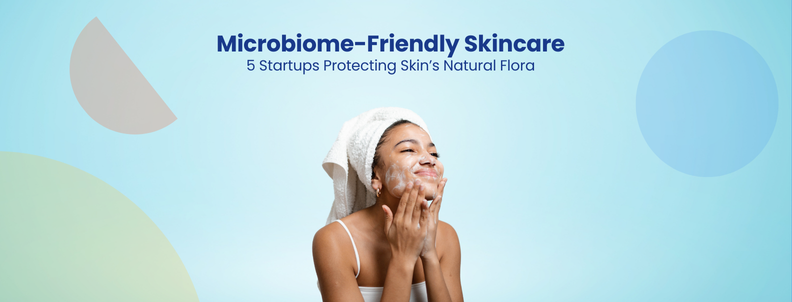Despite the remarkable progress made in reducing global hunger and malnutrition, the statistics remain alarming, especially for children. According to the Global Network Against Food Crises, a staggering 36 million children worldwide suffer from acute malnutrition.
Recognizing the urgency of this global crisis, forward-thinking companies and startups like Nutricia and Maeil Dairies are forming strategic collaborations and pooling resources to drive innovation in infant nutrition.
While this article discusses recent developments and collaborations within Infant Nutrition, our State of Dairy 2025 report explores multiple trends and startups involved in the domain!
Get your hands on our upcoming dairy trend report to uncover the latest trends shaping the future of infant nutrition.
Fill out the form below and request your copy today!
Recent Developments in Infant Nutrition
Nutricia’s gender-specific infant formula addressing programmed obesity
Nutricia, part of Danone’s Medical Nutrition Division, collaborated with the University of Groningen in the Netherlands to develop a groundbreaking nutritional formula. This formula aims to address the issue of programmed obesity, a condition in which excessive feeding during infancy increases the likelihood of obesity later in life, particularly among females.
A WHO research indicated that girls require fewer calories yet may be more prone to overfeeding with generic formulas.
Unlike current formulas, which overlook gender distinctions, Nutricia’s patent introduces a novel approach by acknowledging boys’ and girls’ unique growth patterns and nutritional requirements.
The proposed solution involves a gender-specific formula that adjusts the lipid content to mitigate the risk of overfeeding in female infants. By tailoring the nutritional composition to match the specific needs of each gender, Nutricia’s innovation can significantly reduce the likelihood of obesity in female individuals later in life.
Hyproca Nutrition’s enhanced separation technology for extracting milk proteins from goat milk
Goat milk-based infant formulas are gaining popularity over those derived from cow’s milk due to their higher digestibility and reduced allergenic potential. However, one key challenge has been isolating and supplementing kappa-casein, a unique protein in goat milk with antimicrobial and immunomodulatory properties, crucial for making infant formulas more similar to human breast milk in casein composition.
Existing technologies for extracting kappa-casein from goat milk casein micelles have faced low yield, low purity, and inefficient production, making them unsuitable for large-scale industrial preparation.
Ausnutria’s Hyproca Nutrition has built a strategic partnership with Jiangnan University, strengthening its R&D capabilities in various aspects, including product development for probiotics and goat milk and scientific research on milk proteomics and lipidomics.
In March 2023, these companies filed a patent for a novel separation technology that improves kappa-casein extraction from goat milk. The patented process utilizes micellar casein concentration, selective precipitation, and ultrasonic-assisted extraction, yielding high-purity kappa-casein with efficient production. This innovation addresses the challenges of current technologies, facilitating the large-scale industrial production of goat milk-based infant formulas that closely mimic the casein composition found in human breast milk.

Maeil Dairies’ food formula infused with breast milk oligosaccharides to enhance infant gut health and immunity
Maintaining a healthy gut and balanced intestinal microflora is crucial for overall well-being, especially in infants. While probiotics, such as lactic acid bacteria, have traditionally been consumed to support intestinal microorganisms, their effectiveness can be limited due to the difficulty in reaching the large intestine.
Maeil Dairies collaborated with the Korea University Research Business Foundation to develop an innovative formula that harnesses the power of breast milk sugars.
The patented formula incorporates galactooligosaccharides and 2′-fucosyllactose, two key breast milk oligosaccharides known for their prebiotic properties. By incorporating 2′-fucosyllactose, this composition aims to provide a prebiotic effect, promoting the formation of a healthy intestinal microflora. Additionally, the formula is designed to improve gut health by increasing the production of beneficial short-chain fatty acids and reducing inflammation in the intestines.
Mead Johnson’s comprehensive hydrolyzed casein formula for enhancing digestive health in premature infants.
Premature infants struggle to get enough nutrition due to weak oral skills, often delaying their intestinal development. This deficiency in intestinal development can lead to excessive inflammation in the gut, compromising their overall health and well-being. Recognizing this critical issue, US-based Mead Johnson, in collaboration with Massachusetts General Hospital, filed a patent in 2021 exploring extensively hydrolyzed casein to address intestinal inflammation and improve gut barrier function in preterm infants.
The proposed solution aims to decrease the expression of inflammatory biomarkers in the intestinal epithelium of preterm infants by incorporating extensively hydrolyzed casein into their nutritional regimen. This innovative approach acknowledges the importance of providing essential nutrients to these vulnerable infants through specialized formulas or supplements added to donor milk, such as human milk fortifiers.
Sangol Farm’s freeze-dried lactic acid bacteria powder for infant snacks and beverages
Korea-based Sangol Farm uses eco-friendly and safe ingredients to work on food products like health concentrate and extract, grain syrups and crackers, etc. They have collaboratively filed a patent with the KNU Industry Cooperation Foundation for developing snacks for infants by mixing fruits and vegetable extract (carrot, pear extract, apple extract, strawberry extract, red beet extract) along with lactic acid bacteria (Lactobacillus plantarum) freeze-dried powder. The invention uses deodeok powder as a cryoprotectant to improve the survival rate of lactic acid bacteria.
All the components serve different nutritional purposes in this composition –
- Carrots, high in beta-carotene, have antioxidant properties, support eye health, and can boost immunity.
- Pears, which contain organic acids, vitamins B and C, fiber, and fat, are good for cold relief and asthma.
- Apples are low in calories and contain dietary fiber, potassium, organic acids, and vitamin C, which are good for the body.
- Strawberry is rich in vitamin C and has excellent antioxidant activity.
- Red beet contains betaine, which has anti-cancer and anti-inflammatory effects by inhibiting cell damage and acting as an antioxidant.
- Deodeok, a vine plant, is rich in potassium, iron, calcium, and phosphorus minerals. It is also abundant in saponin, which is good for fatigue recovery, and inulin, which is called natural insulin and helps control blood sugar.
Furthermore, the snack prepared satisfies consumers’ tastes well and has high processing and distribution stability due to the natural lactobacillus cryoprotectant used in the invention. Sangol Farm has also been selected as an excellent farm by the Ministry of SMEs and Startups.
Future Outlook
The global crisis of childhood malnutrition demands innovative solutions. Recent collaborations in infant nutrition are making significant progress by combining expertise and advanced research to develop groundbreaking products to combat malnutrition and improve children’s futures.
Understanding the current landscape and key innovators is crucial to stay ahead in this rapidly evolving field. Request a tailored landscape study on infant-based nutrition to explore the latest trends and discover the leading companies in this revolutionary approach.
Talk to our experts today!

Also Read – Innovations in Allergy-free infant food for 2024
Authored By – Dharini Sharma, Patent Analytics
Edited By – Ridhima Mahajan, Market Research










